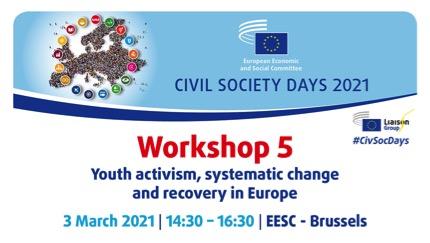European Economic
and Social Committee
Workshop 5: Youth activism, systemic change and recovery in Europe
Wednesday, 3 March 2021, 14:30 - 16:30
Organised by Volonteurope, the European Youth Forum (YFJ) and the EESC Sustainable Development Observatory (SDO)
Download the printable version
Programme
14:30 – 14:45 Welcome from the workshop organisers
- Furkan Sorkuncuk, Volonteurope
- Judit Lantai, European Youth Forum
- Lutz Ribbe, EESC-SDO president
14:45 – 14:55 Workshop "online energiser"
- Scott Graham, ProjectScotland, UK
- James Donnelly, Volunteering Matters, UK
- Giselle Godoy-Sanchez, Volunteering Matters, UK
14:55 – 15:00 Briefing on the workshop
- Piotr Sadowski, Secretary General, Volonteurope
15:00 – 15:55 Breakout sessions (including 5-minute break)
- Health and socio-economic wellbeing – preventing yet another lost generation, led by Volonteurope
- Constantin Dedu, President of Imago Mundi Association, Romania
- Smilla Harmia, Youth Activist, Germany/Finland
- Piotr Maciej Kaczyński, Member of New Europeans Warsaw, Poland
- Human rights, civic space, and participation – protecting and strengthening our democracies; led by the European Youth Forum
- Leonie Martin, President of JEF Europe
- Beyond recovery – sustainable alternatives to rebuild better, more inclusively, led by EESC-SDO
- Chloé Bourguignon, Generation Climate Europe Board Member
- Cillian Lohan, EESC Vice-president for Communication and rapporteur for the opinion Towards structured youth engagement on climate and sustainability in the EU decision-making process
- Alberto Arroyo Schnell, Senior Policy Manager IUCN
- Lena Kollmuβ, Climate Justice Activist, Germany
15:55 – 16:10 Presentation of recommendations from the breakout sessions
16:10 – 16:25 Plenary discussion
16:25 – 16:30 Wrap-up and close
Workshop rationale
There is no denying that the COVID-19 pandemic has caused reverberations across all areas of our lives, our health systems, and our socio-economic and personal wellbeing. What would have been considered pressing problems before the coronavirus crisis have been made even more visible, acute, and challenging for so many groups of people, not least youth. Whilst the young generation might not have been the hardest hit by the COVID-19 crisis in terms of its impact on their physical health, it has hit young Europeans very hard in terms of their education, employment and future economic prospects, their mental health, and their expectations of living fulfilled lives. Moreover, by shifting the focus away from the climate and environment crisis, it has amplified the anxiety already experienced by millions of young people. The consequences of the pandemic, unless effectively challenged and addressed with the active inclusion of young people, pose the risk of yet another lost generation and will disadvantage young people for decades to come.
On its road to recovery and in shaping its future, a sustainable and socially just Europe cannot afford to lose young people along the way. It cannot exist without a robust civic space and, particularly, without dedicated means and spaces for youth engagement in society and decision-making. The European Union as we know it today is built on democratic principles. EU membership requires functioning democracies in Member States. However, the erosion of access to rights for young people is clearly no longer a precedent in a handful of countries, but a worrying trend across Europe. Functioning democracy cannot be imagined without an active civil society and the pandemic has already shown that the crisis has been, in some instances, effectively used to undermine the democratic principles that are the basis of our Union. While civil society in Europe in recent decades has flourished and received increasing support, the most recent examples of violation of the rule of law and fundamental freedoms, populism, and centralisation of power, done visibly and blatantly in the face of the COVID-19 crisis, have led to a number of challenges for the meaningful involvement of civil society. These trends are significantly affecting young people and youth organisations who face specific challenges that make them vulnerable in certain areas.
We in Volonteurope and the European Youth Forum want the future of Europe to work for everyone and ensure that no young person is left behind, and that youth organisations are fully supported in their solidarity actions. When the Conference on the Future of Europe does finally take off, we also want to ensure that it meaningfully engages the voices of young people, so that a systemic change and inclusive recovery are achieved in Europe.
In close cooperation with the EESC-SDO, our workshop will focus on three key themes for the reconstruction of our societies in the wake of the crisis:
- Health and socio-economic wellbeing – preventing yet another lost generation; led by Volonteurope
- Human rights, civic space, and participation – protecting and strengthening our democracies, led by the European Youth Forum
- Beyond recovery – sustainable alternatives to rebuild better, more inclusively, led by EESC-SDO
We will debate the three themes in breakout sessions where we will look to engage young activists, young people directly involved in volunteering and social action, participants in active citizenship projects, facilitators of European and global citizenship education, and those who have experienced obstacles to participation and been directly impacted the COVID-19 pandemic. We will aim to ensure the participation of experts and decision-makers from relevant fields, such as health, youth activism, citizens' rights and climate policy, who can contribute to, and enrich, the discussion. Each breakout session will draw up a key recommendation to EU institutions linked to the COVID-19 recovery and future of Europe, which will form a collective advocacy "ask" resulting from the workshop.
